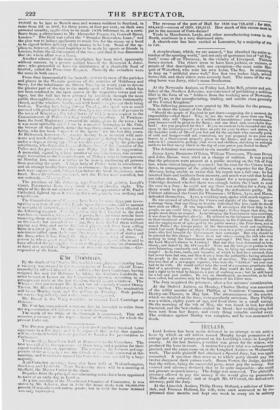At the Newcastle Assizes, on Friday last, John Bell, printer
and pub. lisher of the Northern Liberator, was convicted of publishing a seditious libel in the form of an " Address from the working men of Newcastle- upon-Tyne, to the manufacturing, trading, and middle class generally of the United Kingdom."
The following passages were quoted by Mr. Dundas for the prosecu- tion, to show the nature of the libel-
" Shonld the people of England be out down—supposing, for a moment, the impossibility—what then? Why, to use the words of more than one Whig journal, they will ' disperse in a million of incendiaries ;' your warehouses— your homes—will be given to the flames, and one black ridu overwhelm Eng- land ! Are you prepared for this ? It' you are content to he trampled and spat upon by the aristocracy—if you haVe no pity for your brothers and sisters, in the humbler walks of' life—if you feel not for the myriads who annually perish of cold and hunger—still ask yourselves, are you prepared to see your own homes in a blaze—your property given to the flames, and no insurance to redeem it ? tmurselves, perhaps your wives and children, shrieking to midnight outlaws for that mercy which ill the day of your power you denied to them." The defendant was sentenced to six months' imprisonment.
James Ayre, Bronterre O'Brien, William Thomason, Thomas Devyr, and. John Mason, were tried on a charge of sedition. It was proval that the prisoners were present at a public meeting on the 7th of July
lust, where violent language was used; but the case for the Crown broke down, in consequence of the principal witness, a reporter for the Tyne Mercury, being unable to swear that his report was a full one he had
inserted facts and incidents from memory, and much was said that he had not taken down. His object was to report for a newspaper. Justice Coleridge doubted whether there was enough belbre the Court to send the case to a Jury : he could not say there was nothing for a Jury, but there would be great difficulty in finding the defendants guilty. Mr. Cobbett addressed the Court for Thomason ; O'Brien, Ayre, and Mason,
defended themselves. Ayre, a workingman, spoke with much vigour— lie was accused of' attacking the Crown and dignity of the Queen. It was a strange thing that any thing an humble individual like him could do should
have such an effect. It was impossible, lf sovereigns ditl their duty to the people, no one could bring them into contempt ; if they forgot that duty, the people owed them no respect. .1s to bringing the Government into contdmpt, it was done by themselves already. Ile referred to the in ennons Coercion Bill,
to their treatment of the Dorchester labourers, to the Calthorpe Street affair, and the employment of spies paid by the public money ; the poor-laws, and an armed Police; the foreign poliey of the Government, weak mid vacillating, which had made England au object of scorn even to a petty canton of Switzer- land—this lout brought t Ile Gowevinnent into contempt. But why should he be selected for this charge? Were tlure not others among the rich who were seeking to bring the Government into contempt ? Did they not do so at the Lord Mayor's dinner in London ? Had not limy beCn denOtMCCd 89 base,
bloody, and brutal by Mr. O'Connell ? Were not the two glint parties in the state labouring, constantly and elrectually too, to bring one another into cons tempt ? As to riots, routs, and tumults, of which he had been accused, there had never been but one, and then it arose from the authorities having attacked
the people in the exercise of their right of meeting. The evidence against him was that of a newspaper reporter, who were the " kittlest "set ever man had to do with, lie would rather take the word of is common prostitute than that of a prostitute press. Ile hoped the ,Ttury would do him justice. Ile had a right to be tried lit' his peers, it jury of working men; but he still hoped for a fair and just verdict. lie was no bloodhound, no anarchist, as he had been called, but anxious only for the happiness of his fallow meth
The Jury acquitted the prisoners, after a few minutes' consideration. At the Oxford Assizes, on Monday, Charles Morley was convicted of the wilful murder of Mary Phillips, at Woodcote Common, near llenley-on-Thames, in May last. The circumstances of the murder, which we detailed at the time, were peculiarly atrocious. Mary Phillips was a widow, eighty years of age, and lived alone in a small cottage.
On the morning of' the 8th of May, she was found in bed, her skull fractured, and thebed-clothes soaked in blood: her wedding-ring had been torn front her finger, and every thing valuable carried away. The evidence against Morley was complete, and he WaS sentenced to death.


























 Previous page
Previous page